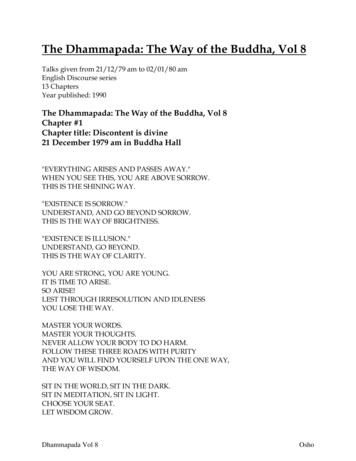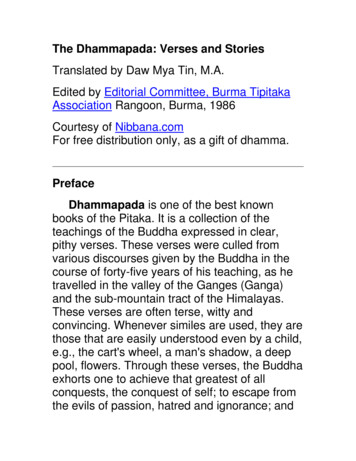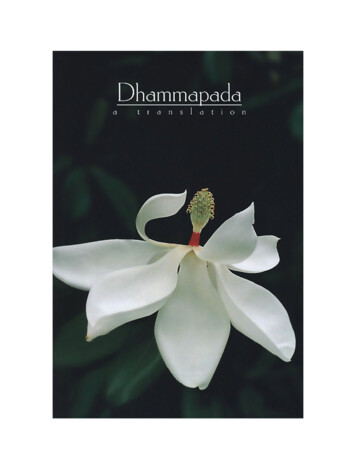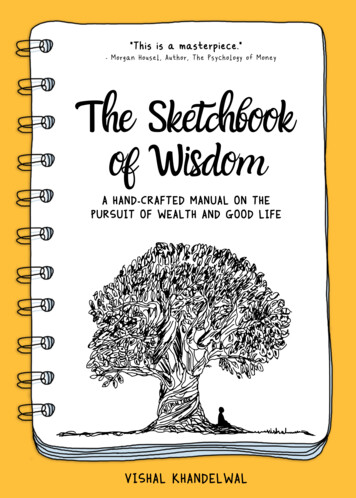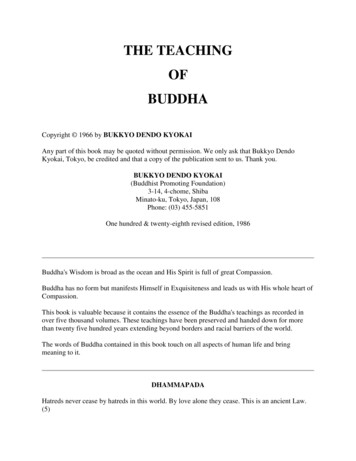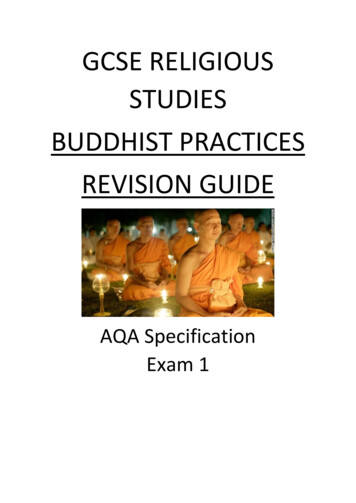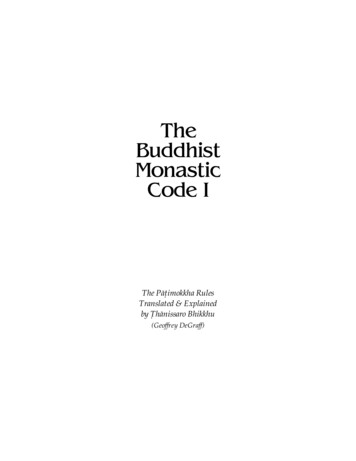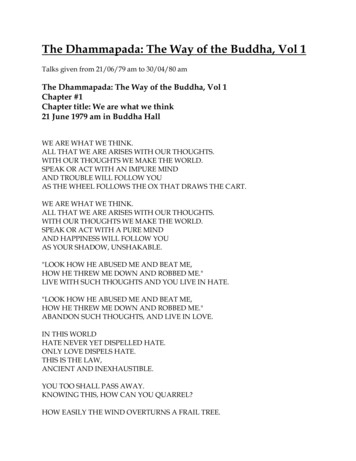
Transcription
The Dhammapada: The Way of the Buddha, Vol 1Talks given from 21/06/79 am to 30/04/80 amThe Dhammapada: The Way of the Buddha, Vol 1Chapter #1Chapter title: We are what we think21 June 1979 am in Buddha HallWE ARE WHAT WE THINK.ALL THAT WE ARE ARISES WITH OUR THOUGHTS.WITH OUR THOUGHTS WE MAKE THE WORLD.SPEAK OR ACT WITH AN IMPURE MINDAND TROUBLE WILL FOLLOW YOUAS THE WHEEL FOLLOWS THE OX THAT DRAWS THE CART.WE ARE WHAT WE THINK.ALL THAT WE ARE ARISES WITH OUR THOUGHTS.WITH OUR THOUGHTS WE MAKE THE WORLD.SPEAK OR ACT WITH A PURE MINDAND HAPPINESS WILL FOLLOW YOUAS YOUR SHADOW, UNSHAKABLE."LOOK HOW HE ABUSED ME AND BEAT ME,HOW HE THREW ME DOWN AND ROBBED ME."LIVE WITH SUCH THOUGHTS AND YOU LIVE IN HATE."LOOK HOW HE ABUSED ME AND BEAT ME,HOW HE THREW ME DOWN AND ROBBED ME."ABANDON SUCH THOUGHTS, AND LIVE IN LOVE.IN THIS WORLDHATE NEVER YET DISPELLED HATE.ONLY LOVE DISPELS HATE.THIS IS THE LAW,ANCIENT AND INEXHAUSTIBLE.YOU TOO SHALL PASS AWAY.KNOWING THIS, HOW CAN YOU QUARREL?HOW EASILY THE WIND OVERTURNS A FRAIL TREE.
SEEK HAPPINESS IN THE SENSES,INDULGE IN FOOD AND SLEEP,AND YOU TOO WILL BE UPROOTED.THE WIND CANNOT OVERTURN A MOUNTAIN.TEMPTATION CANNOT TOUCH THE MANWHO IS AWAKE, STRONG AND HUMBLE,WHO MASTERS HIMSELF AND MINDS THE LAW.IF A MAN'S THOUGHTS ARE MUDDY,IF HE IS RECKLESS AND FULL OF DECEIT,HOW CAN HE WEAR THE YELLOW ROBE?WHOEVER IS MASTER OF HIS OWN NATURE,BRIGHT, CLEAR AND TRUE,HE MAY INDEED WEAR THE YELLOW ROBE.My beloved bodhisattvas. Yes, that's how I look at you. That's how you have to startlooking at yourselves. Bodhisattva means a buddha in essence, a buddha in seed, abuddha asleep, but with all the potential to be awake. In that sense everybody is abodhisattva, but not everybody can be called a bodhisattva -- only those who havestarted groping for the light, who have started longing for the dawn, in whose heartsthe seed is no longer a seed but has become a sprout, has started growing.You are bodhisattvas because of your longing to be conscious, to be alert, because ofyour quest for the truth. The truth is not far away, but there are very few fortunate onesin the world who long for it. It is not far away but it is arduous, it is hard to achieve. It ishard to achieve, not because of its nature, but because of our investment in lies.We have invested for lives and lives in lies. Our investment is so much that the veryidea of truth makes us frightened. We want to avoid it, we want to escape from thetruth. Lies are beautiful escapes -- convenient, comfortable dreams. But dreams aredreams. They can enchant you for the moment, they can enslave you for the moment,but only for the moment. And each dream is followed by tremendous frustration, andeach desire is followed by deep failure.But we go on rushing into new lies; if old lies are known, we immediately invent newlies. Remember that only lies can be invented; truth cannot be invented. Truth alreadyis! Truth has to be discovered, not invented. Lies cannot be discovered, they have to beinvented.Mind feels very good with lies because the mind becomes the inventor, the doer. And asthe mind becomes the doer, ego is created. With truth, you have nothing to do.andbecause you have nothing to do, mind ceases, and with the mind the ego disappears,evaporates. That's the risk, the ultimate risk.
You have moved towards that risk. You have taken a few steps -- staggering, stumbling,groping, haltingly, with many doubts, but still you have taken a few steps; hence I callyou bodhisattvas.And THE DHAMMAPADA, the teaching of Gautama the Buddha, can only be taughtto the bodhisattvas. It cannot be taught to the ordinary, mediocre humanity, because itcannot be understood by them.These words of Buddha come from eternal silence. They can reach you only if youreceive them in silence. These words of Buddha come from immense purity. Unless youbecome a vehicle, a receptacle, humble, egoless, alert, aware, you will not be able tounderstand them. Intellectually you will understand them -- they are very simplewords, the simplest possible. But their very simplicity is a problem, because you are notsimple. To understand simplicity you need simplicity of the heart, because only thesimple heart can understand the simple truth. Only the pure can understand that whichhas come out of purity.I have waited long.now the time is ripe, you are ready. The seeds can be sown. Thesetremendously important words can be uttered again. For twenty-five centuries, such agathering has not existed at all. Yes, there have been a few enlightened masters with afew disciples -- half a dozen at the most -- and in small gatherings THEDHAMMAPADA has been taught. But those small gatherings cannot transform such ahuge humanity. It is like throwing sugar in the ocean with spoons: it cannot make itsweet -- your sugar is simply wasted.A great, unheard-of experiment has to be done, on such a large scale that at least themost substantial part of humanity is touched by it -- at least the soul of humanity, thecenter of humanity, can be awakened by it. On the periphery, the mediocre minds willgo on sleeping -- let them sleep -- but at the center where intelligence exists a light canbe kindled.The time is ripe, the time has come for it. My whole work here consists in creating abuddhafield, an energy field where these eternal truths can be uttered again. It is a rareopportunity. Only once in a while, after centuries, does such an opportunity exist. Don'tmiss it. Be very alert, mindful. Listen to these words not only with the head but withyour heart, with every fiber of your being. Let your totality be stirred by them.And after these ten days of silence, it is exactly the right moment to bring Buddha back,to make him alive again amongst you, to let him move amongst you, to let the winds ofBuddha pass through you. Yes, he can be called back again, because nobody everydisappears. Buddha is no longer an embodied person; certainly he does not exist as anindividual anywhere -- but his essence, his soul, is part of the cosmic soul now.If many many people -- with deep longing, with immense longing, with prayerfulhearts -- desire it, passionately desire it, then the soul that has disappeared into thecosmic soul can again become manifest in millions of ways.No true master ever dies, he cannot die. Death does not appear for the masters, does notexist for them. Hence they are masters. They have known the eternity of life. They haveseen that the body disappears but that the body is not all: the body is only theperiphery, the body is only the garments. The body is the house, the abode, but the
guest never disappears. The guest only moves from one abode to another. One day,ultimately, the guest starts living under the sky, with no shelter.but the guestcontinues. Only bodies, houses, come and go, are born and then die. But there is aninner continuum, an inner continuity -- that is eternal, timeless, deathless.Whenever you can love a master -- a master like Jesus, Buddha, Zarathustra, Lao Tzu -if your passion is total, immediately you are bridged.My talking on Buddha is not just a commentary: it is creating a bridge. Buddha is one ofthe most important masters who has ever existed on the earth -- incomparable, unique.And if you can have a taste of his being, you will be infinitely benefited, blessed.I am immensely glad, because after these ten days of silence I can say to you that manyof you are now ready to commune with me in silence. That is the ultimate incommunication. Words are inadequate; words say, but only partially. Silencecommunes totally.And to use words is a dangerous game too, because the meaning will remain with me,only the word will reach you; and you will give it your own meaning, your own color.It will not contain the same truth that it was meant to contain. It will contain somethingelse, something far poorer. It will contain your meaning, not my meaning. You candistort language -- in fact it is almost impossible to avoid distortion -- but you cannotdistort silence. Either you understand or you don't understand.And for these ten days there were only two categories of people here: those whounderstood and those who did not. But there was not a single person whomisunderstood. You cannot misunderstand silence -- that's the beauty of silence. Thedemarcation is absolute: either you understand or, simply, you don't understand -there is nothing to misunderstand.With words the case is just the opposite: it is very difficult to understand, it is verydifficult to understand that you don't understand; these two are almost impossibilities.And the third is the only possibility: misunderstanding.These ten days have been of strange beauty, and of a mysterious majesty too. I nolonger really belong to this shore. My ship has been waiting for me for a long time -- Ishould have gone. It is a miracle that I am still in the body. The whole credit goes toyou: to your love, to your prayers, to your longing. You would like me to linger a littlewhile longer on this shore, hence the impossible has become possible.These ten days, I was not feeling together with my body. I was feeling very uprooted,dislocated. It is strange to be in the body when you don't feel that you are in the body.And it is also strange to go on living in a place which no longer belongs to you -- myhome is on the other shore. And the call comes persistently. But because you need me, itis the compassion of the universe -- you can call it God's compassion -- that is allowingme to be in the body a little more.It was strange, it was beautiful, it was mysterious, it was majestic, it was magical. Andmany of you have felt it. Many of you have felt it in different ways. A few have felt it asa very frightening phenomenon, as if death is knocking on the door. A few have felt itas a great confusion. A few have felt shocked, utterly shocked. But everybody has beentouched in some way or other.
Only the newcomers were a little at a loss -- they could not comprehend what wasgoing on. But I feel thankful to them too. Although they could not understand what wasgoing on, they waited -- they were waiting for me to speak, they were waiting for me tosay something, they were hoping. Many were afraid that I might not speak everagain.that was also a possibility. I was not certain myself.Words are becoming more and more difficult for me. They are becoming more andmore of an effort. I have to say something so I go on saying something to you. But Iwould like you to get ready as soon as possible so that we can simply sit insilence.listening to the birds and their songs.or listening just to your ownheartbeat.just being here, doing nothing.Get ready as soon as possible, because I may stop speaking any day. And let the newsbe spread to all the nooks and corners of the world: those who want to understand meonly through the words, they should come soon, because I may stop speaking any day.Unpredictably, any day, it may happen -- it may happen even in the middle of asentence. Then I am not going to complete the sentence! Then it will hang forever andforever.incomplete.But this time you have pulled me back.These sayings of Buddha are called THE DHAMMAPADA. This name has to beunderstood. Dhamma means many things. It means the ultimate law, logos. By"ultimate law" is meant that which keeps the whole universe together. Invisible it is,intangible it is -- but it is certainly; otherwise the universe would fall apart. Such a vast,infinite universe, running so smoothly, so harmoniously, is enough proof that theremust be an undercurrent that connects everything, that joins everything, that bridgeseverything -- that we are not islands, that the smallest grass leaf is joined to the greateststar. Destroy a small grass leaf and you have destroyed something of immense value tothe existence itself.In existence there is no hierarchy, there is nothing small and nothing great. The greateststar and the smallest grass leaf, both exist as equals; hence the other meaning of theword 'dhamma'. The other meaning is justice, the equality, the nonhierarchic existence.Existence is absolutely communist; it knows no classes, it is all one. Hence the othermeaning of the word 'dhamma' -- justice.And the third meaning is righteousness, virtue. Existence is very virtuous. Even if youfind something which you cannot call virtue, it must be because of yourmisunderstanding; otherwise the existence is absolutely virtuous. Whatsoever happenshere, always happens rightly. The wrong never happens. It may appear wrong to youbecause you have a certain idea of what right is, but when you look without anyprejudice, nothing is wrong, all is right. Birth is right, death is right. Beauty is right andugliness is right.But our minds are small, our comprehension is limited; we cannot see the whole, wealways see only a small part. We are like a person who is hiding behind his door andlooking through the keyhole into the street. He always sees things.yes, somebody ismoving, a car suddenly passes by. One moment it was not there, one moment it is there,and another moment it is gone forever. That's how we are looking at existence. We say
something is in the future, then it comes into the present, and then it has gone into thepast.In fact, time is a human invention. It is always now! Existence knows no past, no future-- it knows only the present.But we are sitting behind a keyhole and looking. A person is not there, then suddenlyhe appears; and then as suddenly as he appears he disappears too. Now you have tocreate time. Before the person appeared he was in the future; he was there, but for youhe was in the future. Then he appeared; now he is in the present -- he is the same! Andyou cannot see him anymore through your small keyhole -- he has become past.Nothing is past, nothing is future -- all is always present. But our ways of seeing arevery limited.Hence we go on asking why there is misery in the world, why there is this andthat.why? If we can look at the whole, all these whys disappear. And to look at thewhole, you will have to come out of your room, you will have to open the door.youwill have to drop this keyhole vision.This is what mind is: a keyhole, and a very small keyhole it is. Compared to the vastuniverse, what are our eyes, ears, hands? What can we grasp? Nothing of muchimportance. And those tiny fragments of truth, we become too much attached to them.If you see the whole, everything is as it should be -- that is the meaning of "everything isright." Wrong exists not. Only God exists; the Devil is man's creation.The third meaning of 'dhamma' can be God -- but Buddha never uses the word 'God'because it has become wrongly associated with the idea of a person, and the law is apresence, not a person. Hence Buddha never uses the word 'God', but whenever hewants to convey something of God he uses the word 'dhamma'. His mind is that of avery profound scientist. Because of this, many have thought him to be an atheist -- he isnot. He is the greatest theist the world has ever known or will ever know -- but he nevertalks about God. He never uses the word, that's all, but by 'dhamma' he means exactlythe same. "That which is" is the meaning of the word 'God', and that's exactly themeaning of 'dhamma'. 'Dhamma' also means discipline -- different dimensions of theword. One who wants to know the truth will have to discipline himself in many ways.Don't forget the meaning of the word 'discipline' -- it simply means the capacity tolearn, the availability to learn, the receptivity to learn. Hence the word 'disciple'.'Disciple' means one who is ready to drop his old prejudices, to put his mind aside, andlook into the matter without any prejudice, without any a priori conception.And 'dhamma' also means the ultimate truth. When mind disappears, when the egodisappears, then what remains? Something certainly remains, but it cannot be called'something' -- hence Buddha calls it 'nothing'. But let me remind you, otherwise you willmisunderstand him: whenever he uses the word 'nothing' he means no-thing. Dividethe word in two; don't use it as one word -- bring a hyphen between 'no' and 'thing',then you know exactly the meaning of 'nothing'.The ultimate law is not a thing. It is not an object that you can observe. It is yourinteriority, it is subjectivity.
Buddha would have agreed totally with the Danish thinker, Soren Kierkegaard. Hesays: Truth is subjectivity. That is the difference between fact and truth. A fact is anobjective thing. Science goes on searching for more and more facts, and science willnever arrive at truth -- it cannot by the very definition of the word. Truth is theinteriority of the scientist, but he never looks at it. He goes on observing other things.He never becomes aware of his own being.That is the last meaning of 'dhamma': your interiority, your subjectivity, your truth.One thing very significant -- allow it to sink deep into your heart: truth is never atheory, a hypothesis; it is always an experience. Hence my truth cannot be your truth.My truth is inescapably my truth; it will remain my truth, it cannot be yours. We cannotshare it. Truth is unsharable, untransferable, incommunicable, inexpressible.I can explain to you how I have attained it, but I cannot say what it is. The "how" isexplainable, but not the "why." The discipline can be shown, but not the goal. Each onehas to come to it in his own way. Each one has to come to it in his own inner being. Inabsolute aloneness it is revealed.And the second word is PADA. 'Pada' also has many meanings. One, the mostfundamental meaning, is path. Religion has two dimensions: the dimension of "what"and the dimension of "how." The "what" cannot be talked about; it is impossible. But the"how" can be talked about, the "how" is sharable. That is the meaning of 'path'. I canindicate the path to you; I can show you how I have traveled, how I reached the sunlitpeaks. I can tell you about the whole geography of it, the whole topography of it. I cangive you a contour map, but I cannot say how it feels to be on the sunlit peak.It is like you can ask Edmund Hillary or Tensing how they reached the highest peak ofthe Himalayas, Gourishankar. They can give you the whole map of how they reached.But if you ask them what they felt when they reached, they can only shrug theirshoulders. That freedom that they must have known is unspeakable; the beauty, thebenediction, the vast sky, the height, and the colorful clouds, and the sun and theunpolluted air, and the virgin snow on which nobody had ever traveled before.all thatis impossible to convey. One has to reach those sunlit peaks to know it. 'Pada' meanspath, 'pada' also means step, foot, foundation. All these meanings are significant. Youhave to move from where you are. You have to become a great process, a growth.People have become stagnant pools; they have to become rivers, because only riversreach the ocean. And it also means foundation, because it is the fundamental truth oflife. Without dhamma, without relating in some way to the ultimate truth, your life hasno foundation, no meaning, no significance, it cannot have any glory. It will be anexercise in utter futility. If you are not bridged with the total you cannot have anysignificance of your own. You will remain a driftwood -- at the mercy of the winds, notknowing where you are going and not knowing who you are. The search for truth, thepassionate search for truth, creates the bridge, gives you a foundation. These sutras thatare compiled as THE DHAMMAPADA are to be understood not intellectually butexistentially. Become like sponges: let it soak, let it sink into you. Don't be sitting therejudging; otherwise you will miss the Buddha. Don't sit there constantly chattering in
your mind about whether it is right or wrong -- you will miss the point. Don't bebothered whether it is right or wrong.The first, the most primary thing, is to understand what it is -- what Buddha is saying,what Buddha is trying to say. There is no need to judge right now. The first, basic needis to understand exactly what he means. And the beauty of it is that if you understandexactly what it means, you will be convinced of its truth, you will know its truth. Truthhas its own ways of convincing people; it needs no other proofs.Truth never argues: it is a song, not a syllogism.The sutras:WE ARE WHAT WE THINK.ALL THAT WE ARE ARISES WITH OUR THOUGHTS.WITH OUR THOUGHTS WE MAKE THE WORLD.It has been said to you again and again that the Eastern mystics believe that the world isillusory. It is true: they not only believe that the world is untrue, illusory, maya -- theyknow that it is maya, it is an illusion, a dream. But when they use the word sansara -the world -- they don't mean the objective world that science investigates; no, not at all.They don't mean the world of the trees and the mountains and the rivers; no, not at all.They mean the world that you create, spin and weave inside your mind, the wheel ofthe mind that goes on moving and spinning. Sansara has nothing to do with the outsideworld.There are three things to be remembered. One is the outside world, the objective world.Buddha will never say anything about it because that is not his concern; he is not anAlbert Einstein. Then there is a second world: the world of the mind, the world that thepsychoanalysts, the psychiatrists, the psychologists investigate. Buddha will have a fewthings to say about it, not many, just a few -- in fact, one: that it is illusory, that it has notruth, either objective or subjective, that it is in between.The first world is the objective world, which science investigates. The second world isthe world of the mind, which the psychologist investigates. And the third world is yoursubjectivity, your interiority, your inner self.Buddha's indication is towards the interiormost core of your being. But you are toomuch involved with the mind. Unless he helps you to become untrapped from themind, you will never know the third, the real world: your inner substance. Hence hestarts with the statement: WE ARE WHAT WE THINK. That's what everybody is: hismind. ALL THAT WE ARE ARISES WITH OUR THOUGHTS.Just imagine for a single moment that all thoughts have ceased.then who are you? If allthoughts cease for a single moment, then who are you? No answer will be coming. Youcannot say, "I am a Catholic," "I am a Protestant," "I am a Hindu," "I am aMohammedan" -- you cannot say that. All thoughts have ceased. So the Koran hasdisappeared, the Bible, the Gita.all words have ceased! You cannot even utter your
name. All language has disappeared so you cannot say to which country you belong, towhich race. When thoughts cease, who are you? An utter emptiness, nothingness, nothingness.It is because of this that Buddha has used a strange word; nobody has ever done such athing before, or since. The mystics have always used the word 'self' for the interiormostcore of your being -- Buddha uses the word 'no-self'. And I perfectly agree with him; heis far more accurate, closer to truth. To use the word 'self' -- even if you use the word'Self' with a capital 'S', does not make much difference. It continues to give you thesense of the ego, and with a capital 'S' it may give you an even bigger ego.Buddha does not use the words atma, 'self', atta. He uses just the opposite word: 'noself', anatma, anatta. He says when mind ceases, there is no self left -- you have becomeuniversal, you have overflowed the boundaries of the ego, you are a pure space,uncontaminated by anything. You are just a mirror reflecting nothing.WE ARE WHAT WE THINK. ALL THAT WE ARE ARISES WITH OUR THOUGHTS.WITH OUR THOUGHTS WE MAKE THE WORLD.If you really want to know who, in reality, you are, you will have to learn how to ceaseas a mind, how to stop thinking. That's what meditation is all about. Meditation meansgoing out of the mind, dropping the mind and moving in the space called no-mind.And in no-mind you will know the ultimate truth, dhamma.And moving from mind to no-mind is the step, pada. And this is the whole secret ofTHE DHAMMAPADA.SPEAK OR ACT WITH AN IMPURE MINDAND TROUBLE WILL FOLLOW YOUAS THE WHEEL FOLLOWS THE OX THAT DRAWS THE CART.Whenever Buddha uses the phrase 'impure mind' you can misunderstand it. By 'impuremind' he means mind, because all mind is impure. Mind as such is impure, and nomind is pure. Purity means no-mind; impurity means mind.SPEAK OR ACT WITH AN IMPURE MIND -- speak or act with mind -- ANDTROUBLE WILL FOLLOW YOU. Misery is a by-product, the shadow of the mind, theshadow of the illusory mind. Misery is a nightmare. You suffer only because you areasleep. And there is no way of escaping it while you are asleep. Unless you becomeawakened the nightmare will persist. It may change forms, it can have millions offorms, but it will persist.Misery is the shadow of the mind: mind means sleep, mind means unconsciousness,mind means unawareness. Mind means not knowing who you are and still pretendingthat you know. Mind means not knowing where you are going and still pretending thatyou know the goal, that you know what life is meant for -- not knowing anything aboutlife and still believing that you know.This mind will bring misery as certainly AS THE WHEEL FOLLOWS THE OX THATDRAWS THE CART.
WE ARE WHAT WE THINK.ALL THAT WE ARE ARISES WITH OUR THOUGHTS.WITH OUR THOUGHTS WE MAKE THE WORLD.SPEAK OR ACT WITH A PURE MINDAND HAPPINESS WILL FOLLOW YOUAS YOUR SHADOW, UNSHAKABLE.Again, remember: when Buddha says "pure mind" he means no-mind. It is very difficultto translate a man like Buddha. It is almost an impossible job, because a man likeBuddha uses language in his own way; he creates his own language. He cannot use theordinary language with ordinary meanings, because he has something extraordinary toconvey.Ordinary words are absolutely meaningless in reference to the experience of a Buddha.But you should understand the problem. The problem is, he cannot use an absolutelynew language; nobody will understand. It will look like gibberish.That's how the word 'gibberish' came into existence. It comes from a Sufi; his name wasJabbar. He invented a new language. Nobody was able to make head or tail of it. Howcan you understand an absolutely new language? He looked like a madman, utteringnonsense, utter nonsense. That's how it happens! If you listen to a Chinese and youdon't understand Chinese, it is utter nonsense.Somebody was asking a man who had gone to China, "How do they find such strangenames for people? -- Ching, Chung, Chang."The man said, "They have a way: they collect all the spoons in the house and they throwthem upwards, and when those spoons fall down.ching! chung! chang! or whatsoeversound they make, that's how they name a child."But the same is the case: if a Chinese hears English he thinks, "What nonsense!"If that is the case with languages which millions of people use, what will be the casewith a Buddha if he invents an original language? Only he will understand it andnobody else. Jabbar did that -- must have been a very courageous man. People thoughtthat he was mad.The English word 'gibberish' comes from Jabbar. Nobody knows what he was saying.Nobody has even tried to collect it.how to collect it? There was no alphabet. And whathe was saying was making no sense at all, so we don't know what treasures we havemissed.The problem for Buddha is that either he has to use your language as you use it -- thenhe cannot convey his experience at all -- or he has to invent a new language nobody willunderstand. So all great masters have to be very much in the middle. They will use yourlanguage, but they will give your words their color, their flavor. The bottles will beyours, the wine will be theirs. And thinking that because the bottles are yours the wineis also yours, you will carry them for centuries. And there is a possibility that, thinking
that it is your wine because the bottle is yours, sometimes you may drink out of it, youmay become drunk.That's why it is very difficult to translate. Buddha used a language that was understoodby the people who surrounded him, but he gave twists and turns to words in such asubtle way that even people who knew the language were not alerted, were notshocked. They thought they were hearing their own language.Buddha uses the words "pure mind" for no-mind, because if you say "no-mind,"immediately it becomes impossible to understand. But if you say "pure mind," thensome communication is possible. Slowly slowly, he will convince you that pure mindmeans no-mind. But that will take time; very slowly you have to be caught and trappedinto a totally new experience. But remember always: pure mind means no-mind,impure means mind.By putting these adjectives, impure and pure, he is compromising with you so that youdon't become alerted too early and escape. You have to be allured, seduced. All greatmasters are seductive -- that is their art. They seduce you in such a way that slowlyslowly, you are ready to drink anything, whatsoever they give. First they supply youwith ordinary water, then slowly slowly, wine has to be mixed in it. Then water has tobe withdrawn.and one day you are completely drunk. But it has to be a very slowprocess.As you go deeper into the sutras you will understand. Impure mind means mind, puremind means no-mind. And happiness will follow you if you have a pure mind or nomind. HAPPINESS WILL FOLLOW YOU AS YOUR SHADOW, UNSHAKABLE.Misery is a by-product, so is bliss. Misery is a by-product of being asleep, bliss is a byproduct of being awake. Hence you cannot seek and search for bliss directly, and thosewho seek and search for bliss directly are bound to fail, doomed to fail. Bliss can beattained only by those who don't seek bliss directly; on the contrary, they seekawareness. And when awareness comes, bliss comes of its own accord, just like yourshadow, unshakable."LOOK HOW HE ABUSED ME AND BEAT ME,HOW HE THREW
The Dhammapada: The Way of the Buddha, Vol 1 Talks given from 21/06/79 am to 30/04/80 am The Dhammapada: The Way of the Buddha, Vol 1 Chapter #1 Chapter title: We are what we think 21 June 1979 am in Buddha Hall WE ARE WHAT WE THINK. ALL THAT WE ARE ARISES WITH OUR THOUGHTS. WITH OUR THOUGHTS WE MAKE THE WORLD. SPEAK OR ACT WITH AN IMPURE MIND



